- Home
- Barbara Metzger
Miss Treadwell's Talent Page 2
Miss Treadwell's Talent Read online
Page 2
This was a strident: “Mama, how could you!”
Lady Tremont feigned a yawn. “How could I do what, dearest?”
Maylene sputtered. “What? What? Why, you practically threw me at that poor man’s head.”
“Oh, no, dearest. He is not a poor man at all. Quite well to pass, I understand from your own notes. And I am sure his trustees will loosen the purse strings even further should he take a calm, capable wife such as you.”
Maylene Treadwell was anything but calm at this moment. Her blue eyes were flashing, her hands were at her narrow waist, and what order she’d managed to bring to her unruly curls disappeared with the flying hairpins as she shook her head. “Mama, the man has less intelligence than a turnip!”
“Yes, he was quite dense about the matter, wasn’t he? You’ll just have to work a bit harder to show him how suitable such a match can be, won’t you, dear?” Lady Tremont touched her own blond hair, which was as neat under its frilly cap as it was that morning when her maid had pinned it. “I daresay you’ll manage. You always do.”
“But, Mama, I do not want to manage such a catastrophe! Lord Shimpton and I wed?” She wailed again.
“Well, dearest, you must admit you are not getting any younger.”
Maylene was growing older by the minute. Juggling nonexistent finances, worrying that Polite Society was laughing at them, feeling like a charlatan, was taking its toll. Why her hair hadn’t already turned gray from all the worrying she did was a miracle itself. Likely it would tonight, from such an outrageous suggestion. Perhaps she’d put on caps, too.
Mama was going on: “And eligible gentlemen are not crowding our drawing room, are they?”
No, only dead gentlemen were, Maylene thought. “But Lord Shimpton?”
“The viscount has endearingly boyish qualities.”
“A boy who has been playing in the muck, I swear.”
“I am certain you could easily convince him of the benefits of more frequent washes, May.”
“That harridan who raised him was likely afraid he’d drown himself in a hip bath. He is a mooncalf, Mama,” Maylene insisted.
“Who can be taught to follow your lead.”
“If I wanted a pet, Mama, I would get a dog, not a husband.”
“Faugh, you are being too particular, dear. You know Lord Shimpton will neither stray nor gamble away his patrimony.”
“The way my father did.”
A frown creased Lady Tremont’s pretty face when she recalled her late husband. “You would not wish to wed a domineering sort, like Lord Crowley, I am sure.”
And like her father, Maylene thought. Then she said, “No, I am much too managing a female to be a complacent, compliant wife. That does not mean I wish to become a nursemaid to my husband. Lord Shimpton needs a keeper, Mama, not a spouse.”
Her mother stroked Maylene’s cheek. “Very well, dearest. You don’t have to have the viscount. But you will help him find a suitable bride, won’t you? I’m afraid the poor dear will make a mull of it on his own.” She waited for Campbell to wheel in the tea cart before adding, “You do have the talent for such endeavors.”
Maylene gave an unladylike snort. “There is no such thing as a finder’s talent, Mama, and if there were, I wouldn’t possess it. You are the one who believes in magic, not I.”
Lady Tremont frowned over her teacup. “Powers of the mind, dear, not magic. We all have strengths beyond our puny understanding, if only we are willing to reach for them, accept them, let them flow through us like the purest light from on high.”
Now Maylene yawned. She had heard the lecture before. Her mother should save the fustian for the paying customers—or for Max. She added another lump of sugar to her tea, to rid herself of the sour taste the reminder of the family business left in her mouth.
“Deny it all you want,” Lady Tremont was going on, as if she could see into Maylene’s mind, as well as into the beyond. “But you do have a knack for finding things, dearest. An intuition, if you will. Why, I’ll never forget the way you found Lady Ponsonby’s brooch that time, within seconds of her mentioning it, and you no taller than an end table.”
The story of the long-ago afternoon call to Ponsonby Place had grown apocryphal in time. Maylene knew her efforts were futile, but she tried. “Mama, as soon as Lady Ponsonby said her jewel had gone missing, that maid dropped a teaspoon. She looked as guilty as a fox in a feather boa. Anyone could have made the deduction.”
“But you were the one who suggested the maid be sent on an errand so we could search her room. And there it was!”
Maylene sighed. “And if the maid had been wearing the brooch pinned to her petticoats, or had already sold it, Lady Ponsonby would still be missing her heirloom.”
“No, you would have found it. A mother knows. You’re always finding my reticule for me, and Aunt Regina’s spectacles.”
“Those items are merely misplaced, not lost or stolen. I simply go looking until I find them, nothing more. It’s logic, Mama, not witchery.”
“And finding Lord Castleberry’s watch? Mrs. Jarrett’s little nephew? The key to your father’s lockbox?”
“Logic, Mama,” Maylene insisted. “And careful research. Campbell and his nephews scoured the backstreet jewelers for the watch, and the child was hiding in the stables, where anyone with an iota of knowledge about little boys would have thought to look. Castleberry and Mrs. Jarrett were more comfortable endowing scientific research than paying a gentlewoman a reward; that’s how you were able to convince them of my so-called talent. I did not call forth any special forces to guide my search, Mama. I am not a sorceress.”
Lady Tremont patted her daughter’s hand. “We cannot all be mediums, dearest. Be proud of your own gift.”
Maylene ground her teeth in frustration. She’d make one last attempt for the night. “If logic and reason are gifts, then I will accept them, especially when they help put food on our table. As for my father’s lockbox, you were the one who begged me to keep looking for the key, rather than blowing the thing up with his dueling pistol. It was empty except for yet another gambling debt. We’d have done better to have left it unopened.”
“I never claimed to be fortune-teller, May. I was afraid the contents would be destroyed if we exploded the box. And I was hoping Tremont had left something of value there, a bank book or a deed or a piece of jewelry, anything we might have lived on so I could have provided you with a dowry.”
Lady Tremont dabbed at the moisture in her eyes with a delicate lace-edged handkerchief. Maylene was lost, and she knew it. “Very well, Mama, I will help Lord Shimpton find a wife.” She raised her chin. “But I will not marry him myself. I cannot think of another gentleman I would less like to be bound to for the rest of my earthly days. And eternity, if you and Max are correct.”
“What about Cousin Grover?” her mother asked.
“I said gentleman.”
Her mother clucked her tongue. “Grover Treadwell is as wellborn as any sprig of the nobility.”
The current Baron Tremont, Maylene’s father’s scurvy cousin Clarence’s son, Grover, was of an age with Maylene. That was about all they had in common. “Very well, Mama, you are correct. Cousin Grover makes Lord Shimpton look like young Lochinvar. I would still rather wed the coal man than either one of them.”
Unfortunately, she might not have the choice. Not content to inherit a mortgaged country estate and empty coffers—and Maylene could not really blame him for his ire—Grover was determined to get his hands on the Curzon Street house. Not part of the entailment, Treadwell House had been a wedding gift from Lady Tremont’s parents. Grover would get it, as part of his cousin’s estate, but not until his cousin’s widow died, remarried, or went to live with one of her children. Thisbe’s marriage contract guaranteed that. Grover’s pecuniary shortcomings guaranteed that he coveted the well-appointed, prestigiously located property. His social ambitions guaranteed that he found his cousin’s relicts an embarrassment. He blamed them, in fact, fo
r his failure to attract an heiress, any heiress. How many birds could he kill with one stone? If he married his spinster cousin, Maylene, he could ship the lot of them off to the country, where, with any luck, the widow would be burned at the stake for her outré notions. He could sell Treadwell House and set himself up as a man of the town, or he could convert it into a polite gaming hell.
Grover thought he’d like living rent-free in Curzon Street—and like having his pretty cousin in his bed. With Cousin Thisbe’s encouragement, Maylene’s lack of the same did not faze him one whit. In fact, he was so determined to have her and her house, that Maylene’s refusals fell on deaf ears—deaf ears that had hair sticking out of them, besides.
Short of a dagger through his heart, Maylene couldn’t discover a way to make her point, that she would never wed the nodcock. And he was growing more possessive daily, as if his familiarity would compromise her into accepting his hand in marriage. More than once she’d been forced to tolerate his touch, rather than create a scene. She would not be forced into wedding Grover the Groper.
“Grover has more hair than wit, Mama, and he’ll be bald before he’s thirty. Furthermore, he always has that revolting drip at the end of his nose.”
“He was sickly as a child, too. Still, he is eager.”
“He is eager to escape his rented rooms, that’s all. Grover should find himself a bride from the merchant class, since no right-thinking aristocrats will let him near their daughters. One always hears how mill owners and bankers will take on an improvident son-in-law for the sake of his title.”
“But I do not think Grover wishes a wife with connections to trade. You know how he deplores our simple efforts to make ends meet.” Her mother replaced the tea things on the tray and stood, ready to retire. “Well, you’ll figure it out, dear. You really are good at finding whatever needs finding.”
“I’ve been lucky in locating things that have gone missing. Females missing a few cogs are another matter. Only a wantwit would want either Shimpton or Grover.”
Lady Tremont bent to kiss Maylene’s cheek. “You can do it, dearest. You have the talent.”
Chapter Three
Being a finder was better than being a future Baroness Tremont or, heaven forfend, a Lady Shimpton. Maylene stayed on in the parlor, sipping her cold tea, thinking about her mother’s words.
She liked playing at detective, liked organizing her spies and informants, and liked earning the reward monies. She did not feel so helpless, so at the mercy of Society’s fickle whims. Despite her mother’s concerns, she did not have to marry, to be dependent on a feckless male, if she could support herself. As a female without great beauty or fortune or social standing, Miss Treadwell was pleased to get by on her wits, a commodity sadly lacking among the Quality. Why, when Mama told her callers that whatever they were missing—key or coin or important paper—was in the last place they’d look, they hung on her words as if she were the Delphic Oracle. And when they begged her to delve a little further into the arcane and locate the lost ring, recipe, or whatever, Maylene tried to oblige. If they were too stupid or too lazy to trace what had disappeared by negligence or by nefarious means, she was willing to attempt the retrieval, for a price. She was less expensive than Bow Street, less obtrusive than a red-vested Runner, and much more genteel. If the patrons chose to see Maylene’s methodical investigations as being spirit-inspired, guided by one of Lady Tremont’s eerie evening evocations, that was fine, too. A spine shiver was an added bonus to the addlepates who couldn’t find their Adam’s apples.
Between locating souls who had gone on to their reward and stuff that had gone missing, the Treadwells were staying out of the poorhouse. They were staying busy, too, needing a logbook to keep the various seekers straight. Between the almost nightly sessions with Max, the afternoon at-homes when callers came to make appointments, and the various searches and information gathering, the ladies had little time for socializing. Even if they had more free hours, invitations cards were not filling the tray on the mantel, since the Treadwell ladies were known to be unable to reciprocate. They were more likely to be invited as the entertainment than as guests, so they rarely accepted the few invites that came their way. Maylene wondered how, then, she was supposed to find Lord Shimpton a bride.
After all, she had not been able to find herself a husband. Just because she enjoyed her freedom and the feeling of accomplishment, just because she could earn an income, unlike most of the females of her acquaintance, did not mean that Maylene wished to remain single all her days. She might not need a husband, but she desired one, nevertheless. She wanted a home and a family of her own, a normal existence, with no interference from the afterworld. Like every other female, living or dead, she wanted to be loved.
Maylene did not need her mother’s reminder that, instead of gathering rosebuds, she was perilously close to withering on the vine. Nearing her twenty-second year, she was nearly on the shelf.
Her prospects were as cold as the tea in the pot. Without attending the Season’s festivities, the balls and rides in the park, Maylene could not meet eligible gentlemen. Those gullible gossoons who came to her mother’s drawing room were not to be considered. Maylene could not respect any of them, so how could she marry one of them?
Campbell interrupted her dismal thoughts as he came to bank the fire to conserve coal. When he was done, the butler pulled his waistcoat down over a prominent paunch that attested to Cook’s excellent meals. He cleared his throat.
Maylene set her cup down. Campbell would be wanting to close up the house and retire for the night. The Treadwell House ventures took a lot of everyone’s time and effort, loyal staff included.
“A good night’s work, Miss May, if I say so myself,” Campbell told her as he put the tea tray back on the cart to wheel into the kitchen.
“Ah, Lord Shimpton was generous, then?”
“And Lady Crowley also.”
“I thought she might be. I still don’t know if she really wanted to speak to that dirty dish husband of hers or just wanted to make certain he was truly gone.”
“She seemed pleased enough to know he was waiting beyond. I thought the harp a lovely touch, miss.”
Maylene had a terrible thought “He is deceased, isn’t he?”
“Indeed. I sent my nevvies to the newspapers, checking obituaries. Gone aloft or out to sea, he’s dead.”
“That’s all right, then. But what are we going to do about Lord Shimpton? Mama almost promised him a bride, and now the chawbacon is eager for leg shackles.”
Campbell wrinkled a nose that was equally as prominent as his waistline. “Too bad he’s not eager for a bath.”
“I shall leave that to Mama and Max,” Maylene said with a sigh, leaning her head on the raised back of the sofa. “I’ve lost track, Campbell. Do you recall who or what is scheduled for tomorrow? Or should I consult the appointments calendar?”
“I believe the morning has Lord Volstead’s book room penciled in.”
“His uncle’s missing will?”
Campbell nodded his gray head. “He expects your mother to chant a spell and find it in that pigsty of a library.”
“No, he’s merely too lazy to take down every book and search for himself. Besides, the Volstead library hasn’t been dusted since before that uncle died, and his lordship does not want to soil his own hands. He’s too much the squeeze-crab to hire an adequate staff to see the job done. We do have enough help, don’t we?”
Campbell drew himself up, affronted. “Of course, Miss May. My nevvies have arranged for the usual group of youngsters to come. Trustworthy, every one of them.”
“And hungry, of course. Make sure Cook lays in an ample breakfast, and hampers for us to take along. The boys work much better when they are well fed.” With few chances for honest labor, Maylene’s lads, as they were coming to be known, were eager to assist in her investigations in exchange for decent meals and a few coins. They knew she would be generous in sharing any rewards if they were successfu
l, and never out of temper when they were not. None of the crossing sweeps or errand boys had ever had such an employer before. When they were finished, not a speck of dust would be left in Lord Volstead’s library, nor a scrap of paper in any book.
“I suppose we’ll have to see about a new housekeeper for Lord Shimpton after luncheon,” Maylene said. “An honest one.”
“With a touch of superstition to keep her that way,” Campbell added, knowing that the promise of an otherworldly overseer could keep most employees on their toes. A hint that the formidable, if former, Lady Shimpton might be watching ought to be enough.
After a visit to the employment agency and the unpleasant task of getting rid of Shimpton’s current housekeeper, with Campbell and his burly nephews at her side, Maylene would have to face another interminable afternoon of morning callers, absurd as that was. Cook provided a lavish tea, the callers made appointments with Lady Tremont for an evening’s session, and Maylene took notes. She would not even have time for a walk in the park before supper, not if she was to prepare for the evening.
“Everything is ready for Lord Patterson, isn’t it?” she asked Campbell. A great deal of effort had gone into the search on his behalf.
“You know it is, Miss May. You saw to it yourself. Sad story, that.”
“Yes, but we have a happier ending, if it works.” She got to her feet, gathering her shawl and a few straggling hairpins. “I suppose the viscount will return tomorrow evening, also?”
Campbell nodded. “And Lady Crowley, too.”
“I’ll have to make some notes for my mother then, Campy. You go on to bed. I’ll just be a minute more.”
Maylene bit her lip when the butler left. A minute here, an hour there, the afternoon, the evening—and she’d be no closer to finding her own heart’s ease than she was before.
* * *
They found the missing will halfway through the library search, but Maylene kept her small army of boys cleaning and shaking out the musty tomes. She did not like to leave a job half finished, and they were already covered in dust anyway. She was handling the most ancient volumes herself, saving the brittle bindings from the lads’ enthusiasm. A month wouldn’t be enough time to put this collection in order, she thought in disgust at the cheese-paring Lord Volstead. In addition to the will, they found two love letters, a handful of pound notes, and an IOU for ten thousand guineas, signed by a well-known gambler from the previous era. The debt must have been owed to the previous Lord Volstead and never called in by the current holder of the title. Maylene didn’t know if the voucher was still good, but from the generous check Lord Volstead wrote her, she supposed it must be. The nip-farthing was so pleased, and so impressed by her intuition to keep looking after the will was found, that he added another zero to the amount. Campbell’s nephews’ hints that she’d been led to the discovery by a higher power did not hurt, either. Her reputation and her purse were greatly enhanced from the morning’s work.

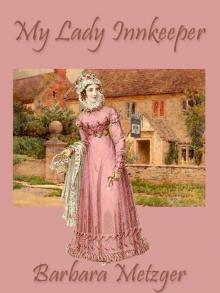 My Lady Innkeeper
My Lady Innkeeper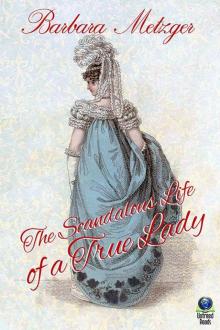 The Scandalous Life of a True Lady
The Scandalous Life of a True Lady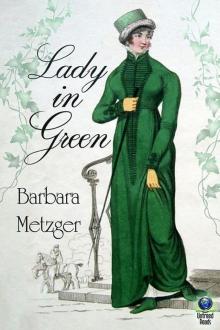 Lady in Green
Lady in Green An Angel for the Earl
An Angel for the Earl Truly Yours
Truly Yours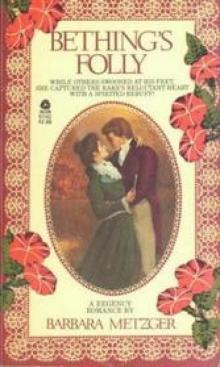 Bething's Folly
Bething's Folly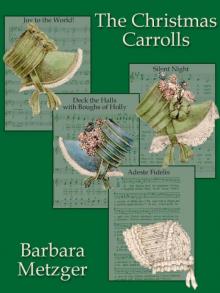 The Christmas Carrolls
The Christmas Carrolls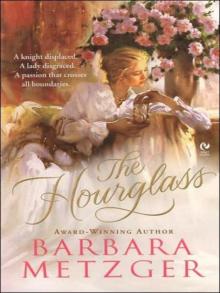 The Hourglass
The Hourglass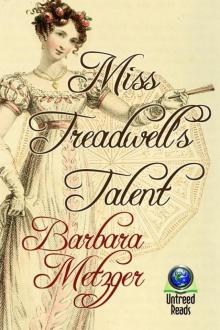 Miss Treadwell's Talent
Miss Treadwell's Talent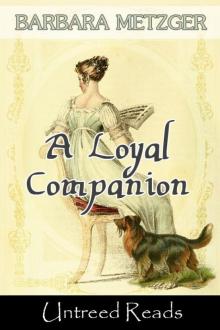 A Loyal Companion
A Loyal Companion Love, Louisa
Love, Louisa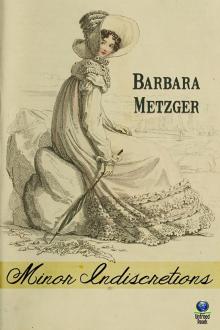 Minor Indiscretions
Minor Indiscretions Jack of Clubs
Jack of Clubs An Enchanted Christmas
An Enchanted Christmas Lady Sparrow
Lady Sparrow Miss Westlake's Windfall
Miss Westlake's Windfall Autumn Glory and Other Stories
Autumn Glory and Other Stories Greetings of the Season and Other Stories
Greetings of the Season and Other Stories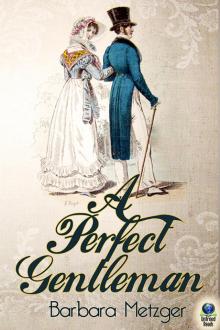 A Perfect Gentleman
A Perfect Gentleman